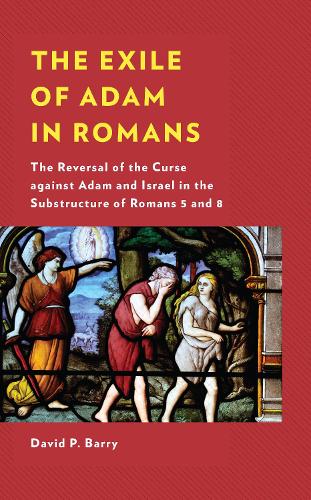
The Exile of Adam in Romans: The Reversal of the Curse against Adam and Israel in the Substructure of Romans 5 and 8
(Hardback)
Publishing Details
The Exile of Adam in Romans: The Reversal of the Curse against Adam and Israel in the Substructure of Romans 5 and 8
By (Author) David P. Barry
Bloomsbury Publishing PLC
Lexington Books/Fortress Academic
12th October 2021
United States
Classifications
Professional and Scholarly
Non Fiction
Christianity
Judaism
227.106
Physical Properties
Hardback
236
Width 163mm, Height 226mm, Spine 23mm
626g
Description
This book investigates the divine son motif in Romans 5 and 8 through the lens of exile and restoration. David P. Barry presents a pattern of allusions to Israel and Adam and argues that Paul deliberately employs both themes to show their fulfillment in Christ. Both Adams exclusion from Eden and Israels exile from Palestine are, for Paul, a divine son falling short of Gods holiness and forfeiting the divine inheritance and presence. The themes of Adam and Israel are complementary examples of sin and separation from God, which Paul argues are reversed in Christ and for believers in union with him. This theme of divine sons provides a framework for interpreting Pauls use of restoration prophecies in Romans 5 and 8. Various references to restoration prophecies (e.g., Ezek 36:2237:14 in Rom 8:111) which were apparently given to ethnic Israel, are applied more broadly. The scope of fulfillment goes beyond its the ethnic boundary to include the spiritual children of Abraham: Jew and Gentile. Barry concludes that the exile is over in spirit, but continues in body. The new people of God are already spiritually restored to Gods presence by faith and will be bodily brought into Gods presence in glory.
Reviews
Is there anything new to say about Romans Yes indeed! Barry compellingly shows the prevalence of underappreciated aspects of Adam Christology in Romans and their relationship to exile. By looking intently at Romans 58, Barry shows that exilic themes in Romans, though prominent, must be tethered to Paul's anthropology. This provides an important angle on discussions of Pauline soteriology that haveperhaps surprisinglyreceived rather scant attention. Barry's study will be of interest to all who study Romans, exile, or Pauline soteriology.
-- Brandon D. Crowe, Westminster Theological SeminaryThis important work provides a distinct reading of Romans 5-8 that successfully incorporates the Adam typology within the wider exile-restoration program. In doing so, not only does it shift the attention from Israel back to Adam, but it also sheds new light on a number of individual passages in Romans. For both the introduction of a fresh paradigm in reading Romans 5-8 and for the exegetical yield that this paradigm produces, this work deserves to be widely read.
-- David W. Pao, Trinity Evangelical Divinity SchoolScholars of Paul have long probed the degree to which exile informs the theology of Romans. David Barry argues that the apostle understands exile to be a covenantal category, integrating Adam, Israel, and Christ. Barry suggestively explores how this understanding of exile both confirms traditional readings of Romans 5 and Romans 8 and opens up fresh readings of these chapters. Written in clear and well-organized prose, this work will stimulate and engage scholars and students alike.
-- Guy Prentiss Waters, Reformed Theological SeminaryThe nature of scholarship is to push the boundaries of our knowledge into new realms. As scholars have increasingly studied the Old Testament and the Second Temple contexts of the New Testament they have discovered how prevalent "the idea of exile" was for first-century Christians. Barry's study of Romans marks another significant further push into this realm of knowledge. It is well researched, helpfully organized, and convincing in its thesis and implications. Anyone interested in the theology of Romans, let alone New Testament theology, cannot afford to overlook this work.
-- Nicholas Piotrowski, Indianapolis Theological SeminaryAuthor Bio
David P. Barry (PhD, Westminster Theological Seminary) is an associate pastor at Midway Presbyterian Church in Powder Springs, Georgia and visiting lecturer in New Testament for Reformed Theological Seminary, Atlanta.
